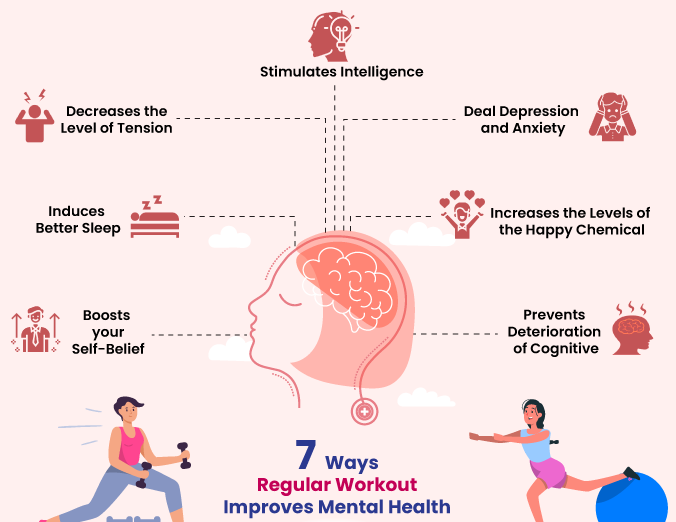Mind Your Body: How Exercise Boosts Mental Health and 5 Top Workouts to Try

Exercise has long been known to have positive effects on physical health, but it is becoming increasingly clear that it also has numerous benefits for mental health. From reducing symptoms of anxiety and depression to improving cognitive function, exercise is a powerful tool for promoting mental wellbeing.
One of the main ways exercises improves mental health is by promoting the release of endorphins. Exercise causes the body to create endorphins, which are organic compounds. They are sometimes referred to as the "feel-good" chemicals because they promote feelings of happiness and wellbeing. Endorphins also act as natural painkillers, which can help reduce physical discomfort and improve mood.
In addition to endorphins, exercise also promotes the production of other neurotransmitters, including dopamine and serotonin. These neurotransmitters are known to have positive effects on mood and have been linked to reduced symptoms of anxiety and depression. Exercise has been shown to be an effective treatment for anxiety and depression because it promotes the production of these neurotransmitters and reduces stress levels.
Regular exercise has also been shown to improve cognitive function. Exercise has been linked to improvements in memory, attention, and processing speed. One study found that adults who exercised regularly had better cognitive function than those who did not. Increased blood flow to the brain through exercise can enhance cognitive performance and lessen the risk of cerebral weakening.
Exercise can also help reduce stress levels. When we experience stress, our bodies release cortisol, a hormone that can have negative effects on both physical and mental health. Regular exercise has been shown to reduce cortisol levels and promote relaxation. Exercise also promotes the production of other neurotransmitters, including norepinephrine and GABA, which can help reduce stress levels.
Better sleep is another benefit of regular exercise. Exercise can enhance the quality of your sleep by encouraging relaxation and lowering tension. Exercise has been shown to help people fall asleep faster and stay asleep longer. Better sleep quality can have numerous benefits for mental health, including improving mood and reducing symptoms of anxiety and depression.
Workout can also aid progress self-confidence and physique. Regular exercise can help improve body composition, which can lead to improved self-esteem and body image. Exercise can also promote a positive self-image and increase self-confidence.
In addition to the benefits listed above, exercise can also improve social life. Joining a group exercise class or sports team can provide a sense of community and social support, which can have numerous benefits for mental health.
There are numerous exercises that can improve mental health, but here are five exercises that are particularly effective:
1. Yoga:
Yoga is a physical and mental practice that can have numerous benefits for mental health. It involves various poses and breathing exercises that promote relaxation, reduce stress, and improve mood. One study found that practicing yoga twice a week for eight weeks reduced symptoms of depression and anxiety in participants.
2. Running:
Running is a great cardiovascular exercise that has numerous benefits for mental health. It promotes the release of endorphins, reduces stress, and improves cognitive function. One study found that running for just 30 minutes three times a week was as effective as medication in reducing symptoms of depression.
3. Strength training:
Strength training is a type of exercise that involves lifting weights or using resistance bands to build muscle and strength. It has numerous benefits for mental health, including improved self-esteem, reduced stress levels, and improved cognitive function. One study found that strength training twice a week for 10 weeks reduced symptoms of anxiety in participants.
4. Swimming:
Swimming is a low-impact exercise that can have numerous benefits for mental health. It encourages easing, lessens anxiety, and rallies attitude. One study found that swimming for just 30 minutes twice a week reduced symptoms of depression in participants.
5. Dancing:
Dancing is a fun and engaging exercise that can have numerous benefits for mental health. It promotes the release of endorphins, reduces stress levels, and improves self-esteem. One study found that dancing twice a week for six weeks reduced symptoms of anxiety and depression in participants.
Incorporating these exercises into your regular routine can have numerous benefits for mental health. It is important to find an exercise that you enjoy and that you can stick with long-term. Consistency is key when it comes to reaping the mental health benefits of exercise.
In conclusion, exercise is a powerful tool for promoting mental wellbeing. It promotes the release of endorphins and other neurotransmitters, reduces stress levels, improves cognitive function, promotes better sleep, and improves self-esteem and body image. Regular exercise can have a significant impact on mental health and overall wellbeing. Incorporating exercise into your daily routine can have numerous benefits and is a simple yet effective way to promote mental health.
